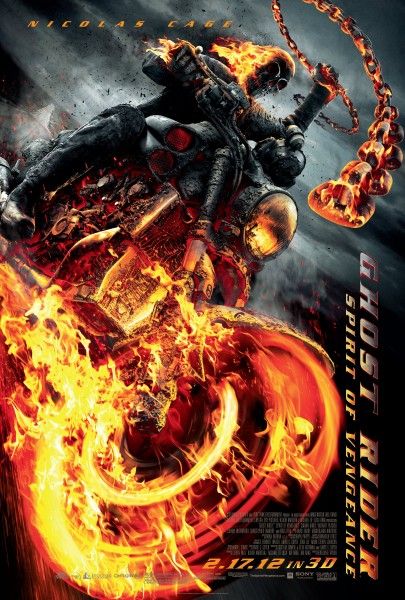In Ghost Rider Spirit of Vengeance, Violante Placido plays Nadya, a street-smart character of Romanian descent who is the mother of Danny Ketch (Fergus Riordan). When the devil (Ciaran Hinds) comes after her son, Placido meets up with Nicolas Cage, who has been brought in by a secret sect of the church to try and save him.
Last year I got to travel to Romania to visit the production while they were filming outside of Bucharest. While on set I participated in a group interview with Placido where she talked about how she got cast, what it was like to work with Cage and directors Neveldine/Taylor, the differences between making movies in Italy and Hollywood, who she plays, filming in Eastern Europe, and a lot more. Hit the jump to read or listen to the interview.
Before going any further, if you haven't seen the new trailer, I'd watch that first. Here's the synopsis:
Nicolas Cage returns as Johnny Blaze in Ghost Rider Spirit of Vengeance. In the successor to Ghost Rider, Johnny - still struggling with his curse as the devil's bounty hunter - is hiding out in a remote part of Eastern Europe when he is recruited by a secret sect of the church to save a young boy (Fergus Riordan) from the devil (Ciaran Hinds). At first, Johnny is reluctant to embrace the power of the Ghost Rider, but it is the only way to protect the boy - and possibly rid himself of his curse forever. Directed by Mark Neveldine and Brian Taylor.
As usual, I'm offering you two ways to get the interview: you can either click here for the audio, or the full transcript is below. Ghost Rider Spirit of Vengeance opens February 17.
Question: So they gave us the indication that your character might be Rom, but might not be? Did you do any research into that culture at all? Or is it really more just off the script?
Violante Placido: I think that the idea of her being a Rom just comes to me perceiving her as someone who has lived in the streets, a tough life, and maybe going around with a gang of people going for things. When she was with Carrigan [Johnny Whitworth], it would be getting money in strange ways, drug dealing and stuff like that. So yeah, that kind of comes into that, but we don’t really see her coming from a Gypsy family or bringing too much of that into the character. It’s more about knowing how to live in the streets.
Talk about the casting process?
Placido: I just did a self-take from Italy. The casting was interested in me because I had come out with The American, so they knew of my existence and they wanted to see me, so I sent the tape to them.
What’s it like going from a film like The American, with very long, stately camera moves, very still film, to a movie where you’ve got guys on rollerblades with the cameras and things, shots flying all over the place?
Placido: Yeah, it’s like getting on a ride on a rollercoaster. It’s totally different and it’s very new experience for me. I’ve never had such an experience, in my country also, because Italy doesn’t even produce these kinds of movies. So it’s very new for me and it’s fun. It’s a new challenge. It’s a different way of working, also, the acting, because as you said before, slow pace and acting with less dialogue, getting more into an intimate kind of acting, more introspective, is totally different from here and I have to get used to it a little bit at the beginning. I mean, there were times where, I would ask Brian [Taylor], maybe get a bit meticulous about something, and he would say, “Look, this is going to be really fast, you don’t even imagine.” And then I got into this pace. I had to get used to it at the beginning and then I started realizing that it will develop a lot also on how the movie is edited and how cuts are very quick and it has to have this kind of rhythm that keeps going kind of tense and also adrenaline at times. It’s totally different.
Did you watch Brian and Mark [Neveldine]’s previous movies and were you at all nervous about what might be expected from you?
Placido: No, I hadn’t seen them but then yeah, then I realized afterwards.
Well, you get the giant gun.
Placido: Yes.
Which is awesome. But I was thinking—we picked it up before, and it’s really heavy. So what’s it been like handling that? Oh, which you can answer after we stop banging chairs.
Placido: Even this interview is becoming dynamic and active.
Yes, there’s a lot of action.
Placido: Sorry?
Yes, handling the giant weapon, because that’s a heavy gun.
Placido: Yeah.
So what’s it been like to use that?
Placido: Yes, my character knows how to use guns and knives and she’s ready to kill, so I just decided to have fun with these elements and try to deal with them in the most natural way possible, even if it seemed quite absurd. At the beginning, when I saw this huge gun, I said, “Okay, well. I’ll try.” She’s got a mission, she’s very determined, so she, she’s confident, even with the guns that are really out of scale for her. But maybe they turn out to be useful and effective.
Can you talk a little bit about working with Nic Cage. What are some of your favorite films by him and do you think that he’s delivering one of his “special” performances? Because you know the way he—you know.
Placido: Yes. Well, when I was really young, I got moonstruck by Moonstruck. Was it called Moonstruck?
Yeah.
Placido: I loved that movie. I really loved it and I was very fascinated by his role, I was just a kid. But I really liked him there. Then, I don’t know what the other one is, The Bad Lieutenant: Port of Call – New Orleans, I liked him there, Vampire’s Kiss. When he does these kind of crazy, quirky roles where he—I think he’s got a very unique way of delivering his roles. He puts a lot of wild creativeness in his characters, and I think he’s doing that in this movie, too. I’ve been in some scenes, because I’m not in all the scenes with him, but in some scenes I’ve seen wild stuff coming out. I mean obviously, having to do with the devil, he’s got complete freedom to go wherever he wants. I mean, there’s no limit to it really.
Speak of the devil, we talked to Ciaran Hinds, and he mentioned a dark past for your character? Could you talk a little bit about that?
Placido: Yes. She has this kind of dark past. I think in this movie, nobody is—everybody’s damned in a way, and she’s a damned soul. Now, at the point where the story starts, mainly she’s a mother. She’s a very protective mother, she’s protecting her child like a wild animal, she would do anything to protect him and she’s running away from something much bigger than her that fell upon her in the past. I’m not going to reveal too much, but she is paying a big price for how she’s lived her life until then, and she has made lots of mistakes. She probably chose a short-cut to follow her dreams, or whatever her dreams were, but she comes from—her life is on the street, maybe even her dreams. She doesn’t have the possibility or didn’t have the possibility to dream of really a good life. Carrigan seemed, probably for her, the best way out of what was her life until then, but in reality even Carrigan is a psychopath, he’s a bad guy. But anyway, they have a past together, that is part of what her dark past is, is like nothing, I mean she’s human, she’s just chosen the wrong path in life to achieve what she wanted to achieve, her personal dreams.
If your son is also the son of the devil, then one could think that you had a relationship with the devil at one point. Is that something that—would that be accurate? Is there something going on there?
Placido: Well, it’s right to think of that, but it’s complex. You find out eventually. She’s had something to do—
Do you become a love interest for Johnny Blaze as well or not really? Because one would expect you to be his—one would expect that in a movie like this—
Placido: Yeah, you would definitely think that.
But he’s kind of damaged right now so maybe he’s just done with women after Roxie or whatever.
Placido: Well—no, I’m just saying, Nadya for now is very…she’s got her son right now to really think about, but they’re all in a different way on the same mission for different reasons.
You mentioned that they don’t make these kinds of movies in Italy. And I asked a question like this of a German actor once. What does the Italian film industry think when they look at these? Do they say, “Wow, we’d really like to do what those Americans are doing?”
Placido: No.
Or are they saying look at those Americans wasting hundreds of millions of dollars on these things?
Placido: No, no, no. It’s like, I think, I think every country also has their own tradition. Eventually, I think cinematography for every culture is a way to explore different stories, different ways of also delivering a story, but eventually, it’s true that each country is strong on some tradition. Italy does not have that. It doesn’t have it because of the budgets and because we come from another kind of cinema, so I don’t think we even think of doing it. I mean, spectators, Italian spectators enjoy watching them, but the industry, I don’t think is even trying to go after this kind of movie. I mean they might want to experiment in different ways, but it’s not…just action movie is not really what we make. And once you got Hollywood doing these kinds of movies and having all the, how you say, the tools to do it, and also to keep on finding new ways of doing it becomes—Hollywood can be avant garde on what concerns action. I mean, Italy, even if it tried, it would always be an under product in that sense. Unless, you know, they just want to mix—it could be an ingredient that Italy wants to put in their movies, but it wouldn’t be about this, about—because then you would need such special effects, which we really don’t have a tradition of.
Do you get any flack for crossing over and making this?
Placido: What’s “flack?”
Negative feedback?
Placido: Oh. I don’t know, I’m going to find out. But I’m fine with that. Because as an actress I really like exploring, doing new experiences, and for me this is something totally new so I have a fresh attitude toward it. And also I’m intrigued by the role, so, I mean for me it’s interesting to play a tough role. To play, you know, a woman which is tough, is brave, has to do—I did a fantastic stunt scene, too, which I really enjoyed.
What was it?
Placido: Can I say about? I don’t know if I can—I’ll just say that I did a big stunt scene that, a stunt could have done it and I decided to do it. And it was very exciting to do. And I have this, this thing, this action, using my body in this sense, is part of me. So maybe in Italy they don’t even know because it just didn’t happen that I could use this aspect.
Do you think it’ll be hard to go back to doing the smaller movies after doing things like this?
Placido: No, not at all for me, because this is something completely different, as I say. I mean, I think Italian cinema is getting back through the last years some of the quality good stories, good acting. So I’m still interested in that. I mean, personally, I tend to watch more—I’m not talking just about Italian cinema, but I’m more into kind of real stories, psychological movies, so this is just something new which is fun for me to be in, but it’s not what I would aim at for the rest of my career. It’s part of a nice experience and maybe I would enjoy having others, but it’s not that without this I’m frustrated. I mean, it’s a super, fantastic occasion for me, but I would be happy to get into more introspective roles and real stories.
You have a lot of offers from Hollywood after they’ve seen The American?
Placido: Well, I’ve had, I did some really interesting castings, had another one that went well, I mean, I had to choose. And I’m casting for other things which are very interesting for me and I’ll find out.
Anything you can talk about at all?
Placido: No.
I knew you’d say that.
Placido: No.
In other words the contract has not been signed yet. I have a question about filming in Romania and Turkey. Can you talk about your experiences in both countries, things that you enjoyed about both countries?
Placido: You said Turkey and Romania right? Yes, well I love traveling, I love discovering new towns, so I was excited about this, and I think we did, we’ve seen some wonderful locations. In Romania, we traveled a lot by car through the country, apart from the city of Bucharest, and that was, we were under Dracula’s castle. I crossed the border and got into Transylvania, and we did this wonderful road around the mountains. I mean, there’s nothing, it’s just nature and, I don’t know, it has a mixture of things, of qualities, that I think go well with the movie, because it’s kind of harsh— you feel a bit of danger, even on those roads. But then it’s also fascinating. There’s a lot of white spaces, untouched. So I liked the nature and the country here. Bucharest also is fascinating. I mean I wouldn’t say it’s really like beautiful city, but it’s fascinating. It’s mysterious and you can see it has a tough past. It’s got some beautiful houses, mansions, which are, most of them are uninhabited at the moment because of the—after the fall of Ceausescu—so they’re still, and they’re really beautiful. But they look haunted because they didn’t, not many people got back in possession of them. Then Turkey was fantastic, Turkey was like mystical and such a special place. Just unique, something that’s really hard to describe, such beauty, those mountains and the stone is kind of, eroded? Special erosion which makes what you see just something that seems, it’s been made for a movie, it’s like something out of fantasy except it’s real. And I went on an air balloon ride, which was thrilling.
How’s the accent play into the movie? We obviously don’t know where she’s from exactly.
Placido: No.
You have this beautiful accent which we—
Placido: Oh, well, I’m trying to make it a little bit harder at some points, and sometimes stick a Romanian word here and there. Because actually, she’s from Romania and she’s from the east, but I’m using some Romanian words here and there, like really maybe tense moments. With her son just, under too much danger, she uses them.
It’s very similar. Isn’t Romanian and Italian derived from Latin?
Placido: Right, right. I mean, I can understand a few words here and there. They understand better Italian than we do.
-
For more on Ghost Rider Spirit of Vengeance:
Nicolas Cage Ghost Rider Spirit of Vengeance On-Set Interview
Idris Elba Ghost Rider Spirit of Vengeance On-Set Interview
Director Brian Taylor Ghost Rider Spirit of Vengeance On-Set Interview
Ciaran Hinds Ghost Rider Spirit of Vengeance On-Set Interview
Fergus Riordan Ghost Rider Spirit of Vengeance On-Set Interview






